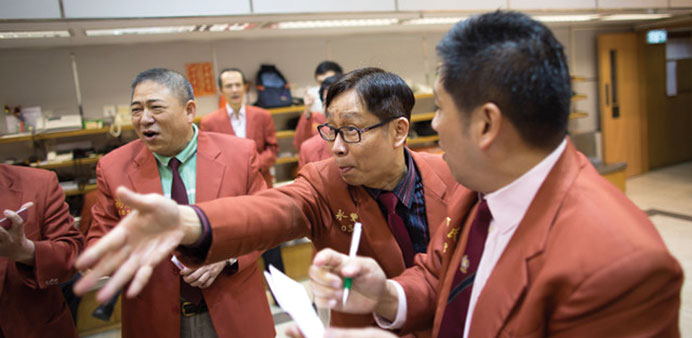Traders at the Shanghai Gold Exchange. The bourse is the world’s biggest physical gold exchange, and all buying and selling of spot bullion in China has to happen through the market.
Reuters/Hong Kong
China is set to launch a link between gold markets in Shanghai and Hong Kong this year following a landmark stock connect scheme, aiming to enhance its pricing power of gold contracts and ultimately challenge its competitors in the West.
While China is the world’s largest consumer of the precious metal, having surpassed India, daily trading of gold in financial centre Shanghai is small compared with London.
The move to develop gold trading comes as more trade flows to Asia and is in line with Beijing’s efforts to open up its domestic markets to foreign investors. China wants more market players to use its yuan currency when settling trade contracts and for making investments.
“We will cooperate with the Shanghai Gold Exchange and set up a link this year, making it a platform for market participants in Hong Kong to enter mainland China’s gold market,” Chan Sheung Chi, president of Hong Kong’s Chinese Gold & Silver Exchange Society said this week. Chan offered no details on how the gold connector would work, but said the launch time could be as early as in June.
The Shanghai Gold Exchange is the world’s biggest physical gold exchange, and all buying and selling of spot bullion in China has to happen through the exchange.
Precious metals and commodities are areas where Beijing has been eager to promote yuan usage, but so far progress has been slow compared to its use for settlement in cross-border trade. The Chinese Gold & Silver Exchange Society, which was founded in 1910 and has 171 member firms, introduced gold bar contracts denominated in yuan in 2011. China’s Bohai Commodity Exchange also launched cross-border spot trading of iron ore and natural rubber in yuan in Hong Kong in 2013.
Potential for the yuan’s internationalisation via gold trading is huge as China is among the largest consumer of many commodities, including coal and copper. Shanghai’s pilot free trade zone also launched an international board for gold trading last year.
The push to open up its tightly-controlled markets comes at a time when western regulators are investigating banks over pricing of metals, providing an opportunity for Asian rivals to have a bigger say in commodity pricing.
US officials are investigating at least 10 major banks for possible rigging of precious-metals markets, even though European regulators dropped a similar probe after finding no evidence of wrongdoing, according to a Wall Street Journal report. London is presently the global benchmark for spot gold while New York is the benchmark for futures prices. Charles Li, chief executive of the Hong Kong Exchanges & Clearing, said the bourse had entered into a new era for mutual market access with the mainland and the former British colony should rely on its advantages to make use of this opportunity.
Li expects more market link-ups to follow after the stock connect scheme was launched last November, including for equity derivatives, commodities, international equities, fixed income and currencies. German exchange operator Deutsche Boerse said last week it aimed to conclude a wide-ranging cooperation agreement with the Shanghai Stock Exchange soon, completing a key element to its Asian expansion plans.

